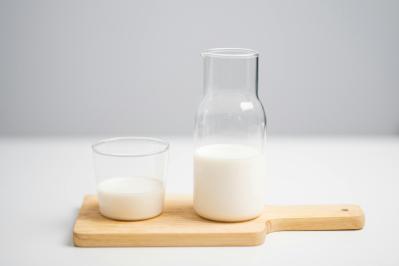
Analysis of milk and dairy products
Milk and dairy products form a versatile group of foods with a wide range of variations. Milk in its pure form or processed, e.g. as yoghurt, kefir, quark or cheese, plays an important role in supplying humans with calcium. Milk and dairy products also serve as a source of readily available protein, which is important for building and maintaining muscle mass. In the form of milk powder or dried milk, it is used in the production of baked goods and confectionery and as a base for instant baby food.
The Tentamus Group with its accredited laboratories supports you in the analysis of milk and dairy products required for quality assurance. The methods of milk analysis are not limited to products made from cow's milk, but also include animal alternatives such as goat's milk or sheep's milk and products made from them. Plant-based milk alternatives such as soy, almonds and nuts or cereals can also be analyzed thanks to the wide range of methods.
Challenges for producers and distributors of milk and dairy products

Raw milk is an untreated natural product and therefore highly perishable and must be processed under strictly controlled conditions. This includes, for example, absolute adherence to the cold chain, impeccable cleanliness of the production facilities and processing procedures that ensure the raw milk is processed quickly. Hygiene is also crucial for a safe end product, particularly in the case of foods such as cheese made from raw milk, which require longer storage and maturing before being placed on the market.
Necessary tests for the analysis of milk and dairy products
Food analysis in the laboratory can ensure that dairy products are safe for human consumption. Microbial contamination with pathogens such as Campylobacter, E. coli, Salmonella or Listeria can be a serious source of danger to human health.
The quality of milk and products such as cheese, quark and yoghurt can also be impaired by chemical residues and contaminants.
The following substances can be detected by laboratory methods:
- Veterinary drug residues (e.g. antibiotics and growth hormones)
- Plant protection products (pesticides) that enter the milk via the animals' feed)
- Mycotoxins (e.g. aflatoxins), which are ingested via feed contaminated with mold)
- Environmental contaminants (e.g. polychlorinated biphenyls (PBC), dioxins)
- Heavy metals (e.g. lead, cadmium, mercury)
But deliberate product adulteration (food fraud) also occurs. There was a major food scandal in China in 2008 when it became known that milk powder and baby food had been mixed with the industrial polymer melamine to simulate a higher protein content, which led to serious illnesses and deaths in children.
Therefore, regular testing of milk and its products for contamination and residues is an important part of food safety monitoring and ensures that consumers receive safe and high quality dairy products.
Nutritional value analyses
The accredited laboratories of the Tentamus Group offer comprehensive nutritional analyses for milk and its products cheese, quark, kefir, yoghurt, but also milk powder for baby food. Our analyses include methods for the determination of macro- and micronutrients, including proteins, fats, carbohydrates, vitamins and minerals. Our precise and reliable analyses help manufacturers and consumers make informed decisions about the nutritional value of milk and dairy products.
Contaminant and residue analysis
The Tentamus Group laboratories offer the following residue analyses for milk analysis:
- Veterinary drugs
- Plant protection products
- Dioxin and dioxin-like PCBs
- PFAS
- Heavy metals
- Cleaning agent residues
- Mycotoxins
Microbiological contamination
Microbiological food analysis includes the determination of the hygiene status (bacterial load) of milk and the detection of indicator germs (e.g. enterobacteria, E. coli) and pathogenic germs (e.g. salmonella).
Sensory testing
Sensory tests are an indispensable part of quality assurance and product development for dairy products. They serve to evaluate the properties of a dairy product with the human senses and thus obtain a comprehensive picture of its quality and help to produce dairy products that meet the highest quality standards.

Testing for genetically modified organisms (GMOs)
Milk analysis also includes the screening, identification and quantification of genetically modified organisms in the milk products tested. This refers to genetically modified plants such as maize and soy, which are consumed by the animals as animal feed. The milk is analyzed for DNA fragments of these plants in order to detect them. Products from animals that have been fed with genetically modified organisms must be labeled.
Labeling test
To ensure that your dairy products are correctly labeled, the Tentamus Group offers labeling tests in accordance with national and international standards. Incorrect labeling can have serious consequences, especially for perishable and potentially allergenic products. The Tentamus Group therefore supports you in the correct labeling of best-before date, net quantity, storage instructions, nutritional labeling and other labeling regulations.
Sample shipment for the analysis of milk and dairy products
The Tentamus Group offers you various options for sending samples to ensure that your milk or dairy products are analyzed quickly and reliably. Refrigerated shipment by parcel service is possible, as is personal delivery of the samples to one of our laboratories. In addition, the Tentamus Group offers a practical collection service for product samples within Germany.
Relevant legal bases and guidelines
- Regulation (EU) No. 1169/2011 of the European Parliament and of the Council (Food Information Regulation, FIR)
- Regulation (EU) No. 1308/2013 on a common organization of the markets in agricultural products
- Milk Products Regulation
- Cheese Regulation
- Butter Regulation
Then contact us at +49 30 206 038 230 or food@tentamus.com.
Overview of Tentamus Group laboratories offering milk and dairy product analysis in Germany
The following laboratories from the Tentamus Group offer the analyses in Germany:
This might also interest you:
- Analyses
Residue analysis
Molecular biological analysis
Microbiological analysis
Food analysis
Sensory testing - Product categories
Baked goods
Eggs
Baby food
Fitness food - Other services
Hygiene training
Sample logistics
Labeling
Sensory training